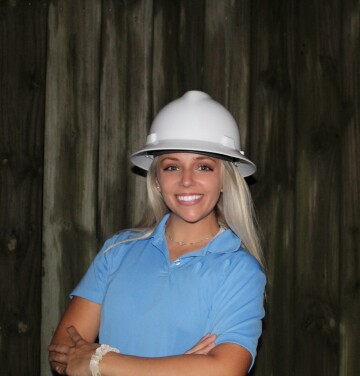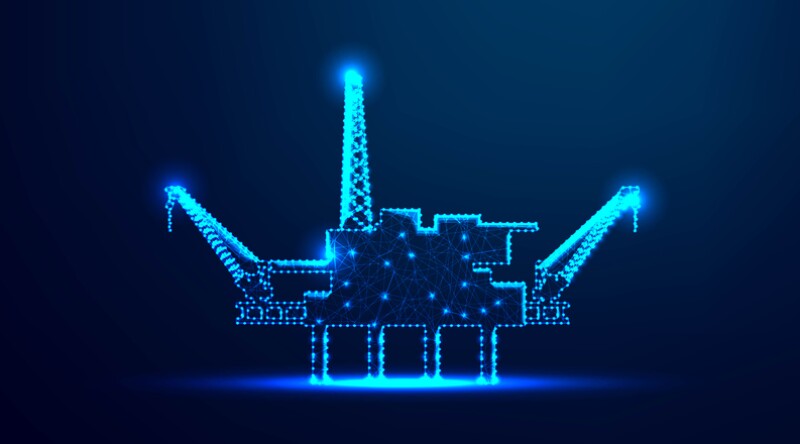Kobi McNutt is a seasoned petroleum engineer with more than 7 years of field experience including four focused on offshore drilling and completions in the Gulf of Mexico.

She has worked across deepwater production facilities and drillships, supporting drilling, completions, rig workovers, and exploration projects. Her hands-on expertise and operational insight continue to advance pioneering developments in offshore energy.
TWA: You’ve worked across deepwater production facilities, drillships, and major rig workovers. For those unfamiliar, what’s a “typical” day like offshore—and is there even such a thing?
KM: There’s really no “typical day” offshore. Your operations are changing daily and everyone’s day looks a little different depending on your role on the ship. For example, a day in my lens as an engineer is totally different from that of a driller’s lens or a dynamic positioning operator working on the bridge.
There’s hardly any consistency while you're offshore so it’s vital to create your own routine to keep up with your mental health. A typical routine for me consists of a 5:00 a.m. wake up, then a 5:30 a.m. safety meeting, followed by my 12-hour workday consisting of writing procedures, double checking calculations, and watching operations. At the end of my day, I always made it a point to get a workout followed by time to watch the sunset on the helideck to unwind from a hectic workday.
TWA: Two weeks on, 2 weeks off: How do you mentally and physically prepare for life on hitch—and what do those transitions back home in Denver look like?
KM: Nothing can really prepare you for how tough it is leaving “normal life,” leaving your friends and family for extended periods of time to live in the middle of the ocean. What gets me through my hitches mentally is having the comforts of home with me on the rig. It's as simple as having your own towel, your own bed sheets, your favorite snacks, etc. The little things make a world of difference on your harder days at work on the water.
The transition back to Denver is unreal. The day the helicopter arrives to bring you back to land is like Christmas morning. The long weeks offshore make the time spent with friends and family on your days off so much sweeter. You really slow down and appreciate the little things land has to offer.
TWA: You were a Division I athlete, and now you’re doing fitness circuits on a rig in the middle of the Gulf. How do sports and engineering intersect in your life and mindset?
KM: Growing up as an athlete taught me how to both push myself mentally and physically. This has really helped me push through the mental barriers of working offshore as well as keeping me healthy and active in a confined environment. Not only has it helped with my mental strength but also my time-management skills working in a fast-paced environment.
Being a student athlete required a lot of time and dedication: to be able to attend 5:00 a.m. weight sessions, 4-hour practices, keep up a full-time class schedule, and required study hall hours, it was a full-time job with little to no free time.
This lifestyle actually prepared me very well for the transition to working 12-hour shifts on an offshore oil rig and helped me acquire the skills to end my day out there with free time to decompress and do the little things that keep me happy and healthy out there.
TWA: Let’s talk STEM and stereotypes. What barriers did you face breaking into this male-dominated field, and how did you learn to push through them?
KM: It was hard and still is hard to be seen as equal to my coworkers. A lot of my thoughts and ideas are shut down or seen as less than due to both my gender and my experience level. Although this is tough, I continue to keep my head held high, learn from those around me, and offer as much support as I can as an engineer, regardless of the backlash I get in the field.
TWA: You launched your social media just last year and already have over 200,000 followers. What inspired you to start sharing your offshore life online?
KM: Honestly, I did not anticipate it gaining traction the way it did. My first post was actually a silly bet I made with some of my coworkers on board the ship. They bet I couldn’t become “Instagram famous” so I put my engineering cap on and started googling “how to make a viral video,” followed the steps, posted the content and overnight the video had a million views, and I had 20,000 new followers!
From there I felt like I needed to use this platform for something more than offshore videos, and over time it is becoming a campaign to advocate and fight for women in male-dominated fields.
TWA: What’s something about working offshore that you wish more people understood—or that surprised you when you started?
KM: I wish the world understood the sacrifice offshore workers make to be in such a demanding, high-risk atmosphere. The work is fascinating and it’s honestly a once-in-a-lifetime opportunity to work in the middle of the ocean, but it doesn’t come without a price. Extended periods of time working long hours, being away from your family and friends is extremely mentally tasking.
A lot of offshore workers work out here for 20+ years, meaning 10+ years of their life is spent living on a boat in the middle of the ocean, away from civilization to help provide the world energy. I think that sacrifice is extremely commendable.
TWA: You’ve become a role model to many young women interested in STEM careers. What advice would you give to someone considering a path like yours?
People will give you a million reasons why you can’t do it. Do it anyway.
TWA: From drills to data, logistics to leadership—what core skills have been most valuable in your engineering journey so far?
KM: Humility and thick skin. You will be thrown into complex problems surrounded by people that have far more experience than you, and you will get torn down for being young and “inexperienced” but don’t let that get you down. Continue to learn and grow from those around you. Continue to ask questions and offer solutions, all it takes is one idea to blossom.
TWA: Where do you see the future of offshore drilling going, and how do you envision your role evolving with it?
KM: I don’t see offshore oil and gas production going away anytime soon. I envision technology advancing and being able to access new reservoirs in harsher environments as oil and gas innovations continue to grow. My role will continue to evolve; working offshore is just the beginning of my career.
My goal is to take my knowledge from executing projects in the Gulf and apply it to begin engineering wellbores, developing assets, and contributing to the oil and gas industry from an office environment for both land and offshore operations.
TWA: If you could go back and give your college self one piece of advice, what would it be?
KM: Get internships early! Energy companies will require you to have some sort of relative work experience to acquire a job straight out of school. Capitalize on your opportunities early!
TWA: In addition to building wells, you’re building visibility for a career path for many students and young professionals. How does it feel knowing your content is helping change perceptions of offshore work?
KM: I am beyond grateful to have been able to create a platform to encourage others to fight the social norm and build careers in industries that society tells them they “don’t belong in.” Who cares what the world thinks? Follow your own arrow and build the life that is going to make you the happiest. Mine just happened to lead me to the middle of the ocean.


